- Home
- Cocker Spaniel Puppy Care
- How to feed your puppy
How To Feed Your Puppy To Help Keep Him Fit And Healthy
You're here because you want to know how to feed your puppy!
As a new puppy parent, you may feel overwhelmed and worried about whether or not you're feeding him properly. Don't worry; these puppy feeding guidelines will give you all the information you need to feel confident about feeding your new pup.
Feeding your puppy healthy, nutritious food at the right time and in the right way will help your new bundle of fur grow into a strong, healthy adult Cocker!
How To Feed A Puppy: Diet And Nutrition
When it comes to feeding your puppy, it's essential to get it right.
Cocker pups grow quickly during their first few months, so they need an exceptionally nutritious diet to help them develop into strong, healthy adult Cocker Spaniels.
When you collected your puppy to bring him home, your breeder may have given you a small bag of puppy food and instructions to help you with your puppy's feeding routine.
I recommend you continue using this food because, apart from being specially formulated to help your pup's growth and development during his early months, your pup's delicate tummy and digestive system are already familiar with it.
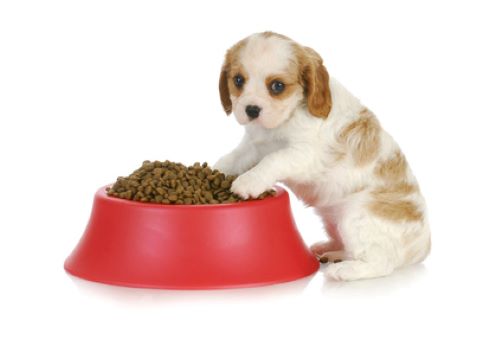 This is how to feed your puppy; lots of crunchy kibble!
This is how to feed your puppy; lots of crunchy kibble!However, if you decide to change your puppy's food later, gradually mix in a little of the new food at each meal time; otherwise, you risk upsetting your puppy's tummy.
Gradually increase the amount of the new food whilst decreasing the old, over 7-10 days, or longer, until you have moved your puppy from the old food to the new.
Why Free Feeding A Cocker Spaniel Isn't Recommended
In case you don't already know what the term 'free-feeding' means, it's just as it sounds; leaving unlimited kibble in your dog's bowl so that food is available to him all day long!
When you have two dogs, it is more important not to free-feed; you may find one dog wolfs down both bowls! Feed them at regular mealtimes but feed each dog separately.
In my experience, puppy eyes are often significantly bigger than their bellies; your greedy little puppy will likely eat much more than he needs! Left to his own devices, you'll almost certainly end up with an obese puppy!
If kibble is always available, it may reduce your puppy's drive for food, which could make it more challenging to train him. If your dog is not motivated by food (for example, as a reward), he is less likely to listen to your training instructions.
Feed your puppy at the recommended feeding times.
Take his food away if he doesn't eat it within 15 minutes. He'll soon learn that if he doesn't eat his kibble at the designated times, he'll have to wait until the next mealtime.
How Often Should I Feed My Puppy?
Puppies must be fed in small amounts regularly throughout the day to not over-stretch their little tummies.
Feeding them this way also keeps their energy levels up all day.
A typical puppy feeding schedule could look like this:
- Once fully weaned and up to 4 months of age: 4 meals each day;
- Between 4 and 6 months of age: 3 meals each day;
- Over 6 months of age: 2 meals daily, morning and evening.
Make sure you evenly space your puppy's meals; for example, If you feed him at 7:00 am, his following meals should be at 11:00 am, 3:00 pm and 7:00 pm, based on four meals daily.
You can change these times to suit your lifestyle, but leave plenty of time between his final meal and bedtime to allow proper digestion.
Please note that the above information is a guide only. If you feel your puppy is off his food, won't eat, is losing weight, is getting a little chubby, or you are worried about your puppy's weight, I recommend you speak to your vet for advice.
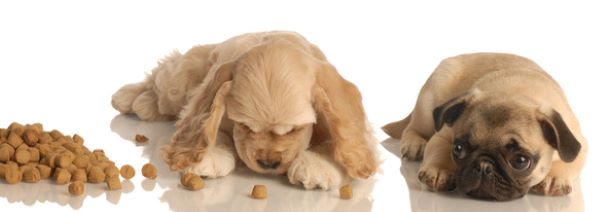 Please may I have some kibble?
Please may I have some kibble?How Much Should I Feed My Puppy?
Puppy feeding requirements will differ for every puppy depending on their size, age and how active they are.
Generally, your breeder will offer you the best advice, but your vet can help too. Additionally, you could refer to the puppy food manufacturer's packaging for guidance.
In my experience, manufacturers' recommendations are often quite generous. When he was a puppy, I reduced Max's kibble allowance by 10% because I felt he was becoming a little 'chubby'.
I feed him a 'senior' mix today, but I still reduce his allowance by around 10% or more if he's had extra bits of chicken or lamb during the day.
How To Feed Your Puppy: Wet or Dry Food?
Nowadays, you can buy a wide range of commercial puppy food, ranging from tinned and organic dog food to dry kibble.
When you buy commercial dog food, you may notice it's often labelled as 'complete' or 'complementary'.
What's the difference?
Complete dog food should contain all the nutrition your puppy needs.
Complementary food should only be part of your pet's diet because it won't meet his nutritional needs. Your dog will need vegetables and carbohydrates, perhaps mixer-biscuits, to ensure his diet is nutritious.
How To Feed Your Puppy: Dry Dog Food
Dry food is a specially formulated complete meal in the form of small, bite-sized biscuits known as kibble.
Popular flavours are lamb, beef, salmon, rabbit and chicken, and it has all the essential oils, vitamins and minerals your dog needs to ensure his diet is fully nutritious.
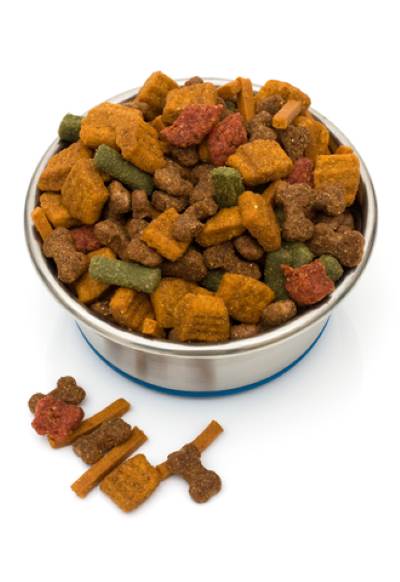 This bowl of kibble looks good enough to eat!
This bowl of kibble looks good enough to eat!Benefits of Kibble
Some of the benefits of feeding your dog kibble:
- It doesn't smell, it's clean, and it's easy to use;
- It lasts longer than an open tin of wet food, which, once opened, needs to be consumed within a day or two;
- Kibble can be good for your puppy's teeth as the crunchy texture helps to remove plaque before it has a chance to build up;
- Whilst kibble may seem more expensive than other dog food because it's a complete meal and there's no waste, it can work out to be good value for money.
Puppy Feeding Tip:
Dry dog food contains very little moisture, so ensuring your puppy has access to plenty of fresh drinking water is essential.
The only downside to kibble (if there is one) is that recently weaned puppies may sometimes refuse to eat it because it's too dry or too crunchy.
To get around this, moisten the kibble with a little warm water and let it soften for a few minutes. Step back and watch your puppy wolf it down.
Personally, I prefer kibble to wet food.
Not only because it provides Max with all the essential nutrients and vitamins he needs to keep him fit and healthy, but because kibble is so easy, needs no preparation, is clean, and doesn't smell - all of the above reasons!
And most important of all, Max loves it!
How To Feed Your Puppy: Tinned Dog Food
If you feed your puppy tinned dog food ('wet food'), check the label for nutrition levels. Some tinned dog foods must be mixed with biscuits to add texture and extra nutrients to make it a 'complete' meal.
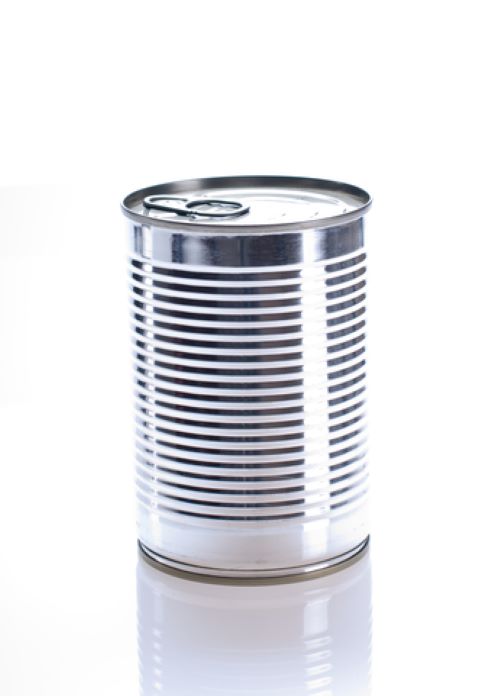 I wonder what's in this tin?
I wonder what's in this tin?Benefits include that it's quick and easy to prepare, especially cans with a ring-pull, and many dogs like, or even prefer soft, wet food.
The downside is that tinned dog food can be messy, sometimes smell, and must be refrigerated when opened and used within a couple of days.
Once in the food bowl, if not eaten, wet dog food can dry out. It can also attract flies and other insects, especially in the summer, which isn't very hygienic!
However, the smell of tinned dog food can be very enticing to dogs!
Puppy Feeding: Homemade or Organic Dog Food?
You might consider feeding your puppy with homemade organic dog food if you prefer to use something other than commercially prepared dog food.
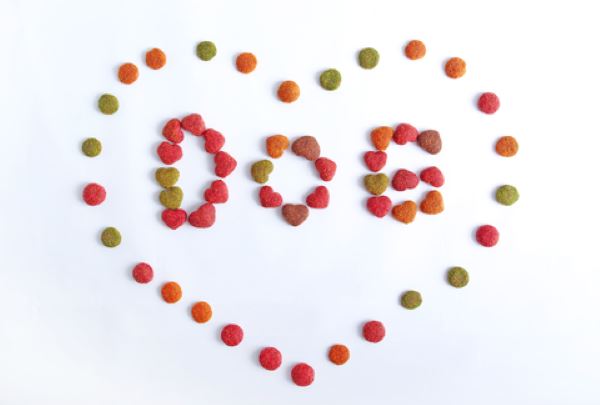 Aw, sweetheart!
Aw, sweetheart!Organic dog food is grown and prepared using environmentally friendly practices and is free from herbicides and pesticides.
An organic dog food diet can have some great benefits for your pet. It can also add precious years to his life besides keeping your Cocker looking in tip-top condition.
Whilst feeding your puppy organic dog food may not be strictly necessary, it is essential to use good quality ingredients. If it's not good enough for human consumption, it's not good enough for your Cocker Spaniel!
Puppy Treats & Extras!
Treats are often used as a reward for good behaviour or during training, but unfortunately, they're not very nutritional.
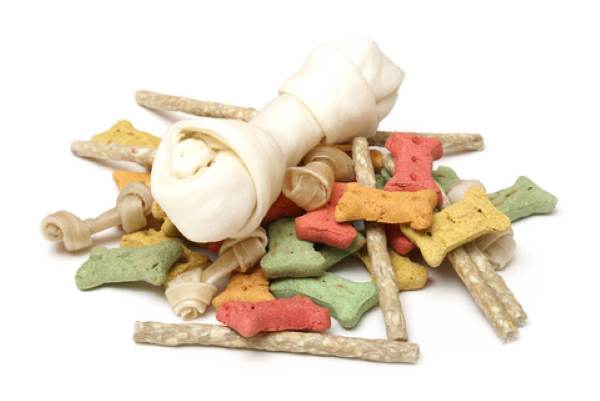 These dog treats look tasty!
These dog treats look tasty!Check the label to know precisely what goes into the treats you're feeding your puppy because some can contain excessive amounts of salt, sugar, and fats.
They very often contain artificial flavours and colours too.
So if you love your puppy, feeding him shop-bought treats should be kept to a minimum.
Rewarding Your Puppy With Homemade Healthy Treats!
Consider making your own healthy dog treats; you might like to try some delicious homemade dog biscuit recipes.
If baking's not for you, a good alternative is to reward him with small pieces of cooked chicken or liver, chopped into little pieces.
Dental sticks are another healthy option to reward your dog for good behaviour; as a bonus, they will help clean the plaque off his teeth.
How To Feed Your Puppy Without Him Becoming Overweight!
Please don't feed your puppy table scraps. Apart from upsetting the well-balanced diet his kibble or wet food provides, feeding your dog from your table will teach him to beg.
This may seem cute while he's still a puppy, but it's bad manners, and when he's a fully-grown dog, I guarantee, you won't like it!
In addition, all those extra calories you feed him will soon begin to mount up, so remember to offset any (healthy) treats or extras fed to your dog during the day against his daily food allowance; otherwise, your puppy will get fat!
Toxic Foods For Puppies
Many everyday human foods can be poisonous to dogs, especially puppies.
Chocolate is just one of them; one large bar of dark chocolate can kill a small puppy, so be careful and make sure all type of chocolate is out of reach of curious, greedy little puppies!
Puppy Feeding & Food Aggression
If your dog believes that you or any other family member are a threat to his food, he may become aggressive, and food aggression can get very nasty.
Getting too close to your puppy when he's feeding can trigger this.
There are things you can do to prevent food aggression, such as:
- Feeding a puppy in a quiet place where he won't be interrupted while he eats is best. If you have more than one dog, always provide their meals separately to avoid fights;
- Making sure children in the family understand the importance of leaving the dog alone while he eats can also help.
I recommend you read this article to help you understand more about dog food aggression. It describes the early warning signs and explains steps you can take to prevent it from happening in the first place or, if it's too late, how you can help remedy it.
Summary of Top Tips for How To Feed Your Puppy
The following reminder of our top tips on how to feed your puppy may help you with your schedule:
- Always ensure your puppy has access to plenty of clean, fresh drinking water, especially if your pup eats dry food.
- Don't allow your puppy to feed all day.
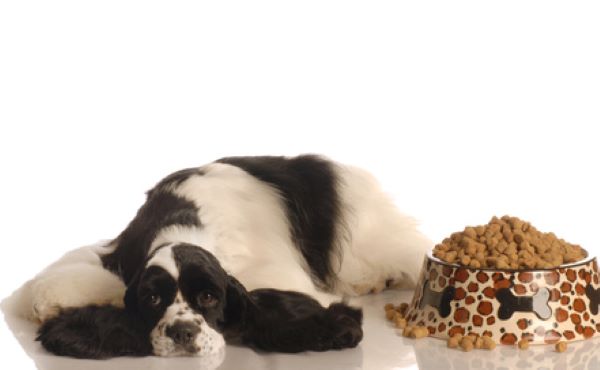 I'm full up, Mum!
I'm full up, Mum!- Always keep tinned dog food covered until required, preferably in the fridge.
- Never feed your puppy with chilled food directly from the refrigerator; always allow the food to come up to room temperature so that it doesn't chill his little tummy. It will taste better too!
- If you feed your dog wet food and he fails to eat it all, don't be tempted to top it up at the following meal time. Doing so is not hygienic, can attract insects, encourage harmful bacteria, and upset little tummies.
- Don't feed your puppy table scraps. This bad habit will teach your puppy that it's okay to beg and will almost certainly make him fat.
- If you can't feel your dog's ribs - your puppy is overweight, and we all know that overweight dogs are unhealthy dogs!
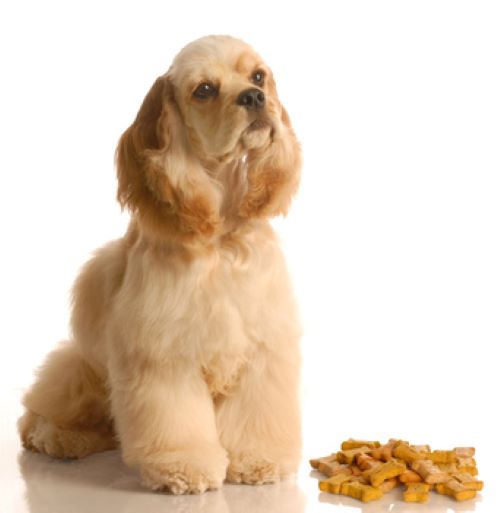 These dog treats are all mine. Would you like one?
These dog treats are all mine. Would you like one?- Remember to reduce your puppy's daily food allowance to accommodate any treats he was rewarded with during the day.
- While learning how to feed your puppy, remember that smaller but frequent meals during the day are best. Always follow your breeder's or food manufacturer's instructions.
- If you change your puppy's diet, do it gradually, over 1 to 3 weeks, to not upset his digestion.
- It's always sensible to regularly check your puppy's stool, as it can indicate a health issue. If your puppy's stool is loose or wet, this may point to a digestive problem and/or his current diet is unsuitable.
You'll find many puppy feeding guidelines on the web; however, despite this, many of our visitors still have lots of questions (understandably so), which is why I've included a link here with their questions and answers. I hope you enjoy them!
If you're worried about your puppy's feeding or digestion, i.e., he won't eat or drink, or his stool is often very loose or contains blood, don't hesitate to call your vet.
Photo credits for How to Feed Your Puppy:
1. Willeecole at Fotolia
2. Willeecole at https://www.fotolia.com/id/10448481
3. Karen Roach at https://www.dreamstime.com/royalty-free-stock-photo-bowl-dog-food-image15720805
4. Tikmindaugas at https://www.dreamstime.com/stock-photos-tin-canned-white-background-image15992053
5. Ludmila Smite at https://www.dreamstime.com/stock-images-pet%60s-food.-image17136494
6. Matthew Benoit at https://www.dreamstime.com/stock-image-dog-treats-image14842011
7. Willee Cole at https://www.fotolia.com/id/10731949
8. Willee Cole at https://www.fotolia.com/id/13105453





